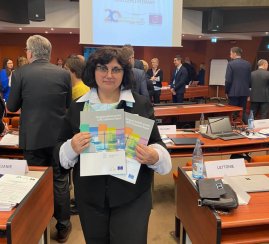Contact center of the Ukrainian Judiciary 044 207-35-46

This was emphasized by the judge of the Criminal Cassation Court within the Supreme Court Oleksandra Yanovska during her speech at the 39th plenary meeting of the European Commission for the Efficiency of Justice (CEPEJ) as a member of this body. The CEPEJ meeting was held on 6-7 December 2022 in Strasbourg (France).
Oleksandra Yanovska expressed her gratitude to the countries whose representatives gathered at the meeting for their invaluable support of Ukraine and assistance in the fight against Russian aggression. She noted that currently one of the most important issues for Ukraine was to ensure proper investigation of war crimes and crimes of aggression, as well as bringing the perpetrators to justice, fair punishment of all those involved in the outbreak and conduct of the war initiated by Russia, compensation for the damage caused to the victims and infrastructure of Ukraine.
The judge of the SC Criminal Cassation Court also spoke about the current state of justice in Ukraine. Thus, the war has changed the judiciary in its own way: 11 % (85) of appellate and local courts do not administer justice; 12 % (93) of court premises are damaged or completely destroyed; 8 % (54) of courts are located on the temporarily uncontrolled territories of Ukraine; 25 % (198) of courts changed the territorial jurisdiction of cases due to the inability to administer justice. The work of the courts is complicated by air raids, when judges, court staff and participants are forced to hide in shelters.
According to Oleksandra Yanovska, despite numerous unprecedented challenges, the majority of judges and court staff are performing their duties. At the same time, the judiciary needs comprehensive support to investigate and try a large number of war crimes committed by the Russian Federation, as well as assistance in the process of gathering evidence for the International Criminal Court.
The speaker called on the international community to do everything possible to facilitate the establishment of a special tribunal for the crime of aggression against Ukraine. She stressed that the support of the international community could be the decisive factor that would balance the scales of justice and restore the violated rights in Ukraine.
Oleksandra Yanovska stressed that the support of the Council of Europe was very important, including the fact that the European Parliament recently recognized Russia as a state sponsor of terrorism. The fruitful cooperation between the Supreme Court and CEPEJ, which began with the Council of Europe project "Support to the Judiciary of Ukraine in Ensuring Better Access to Justice", is also significant. As part of this cooperation, CEPEJ experts are developing a practical guide that will contain criteria for conducting remote court hearings according to European standards.
In addition, during the 39th Plenary Session of the CEPEJ, the Working Group on the evaluation of judicial systems (CEPEJ-GT-EVAL) will present the report on the Evaluation of European Judicial Systems (2022 cycle), which was published on 5 October 2022. The group also presents a draft evaluation system for the 2024 cycle. The Working Group on cyberjustice and artificial intelligence (CEPEJ-GT-CYBERJUST) and the Working Group on quality of justice (CEPEJ-GT-QUAL) will present the work of the Artificial Intelligence Advisory Board (AIAB), recently established to support the CEPEJ on technical aspects of artificial intelligence and cyberjustice.
The Working Group on quality of justice will present for adoption by the CEPEJ Plenary a draft Guideline on Gender Diversity in the Recruitment and Promotion of Judges, as well as a draft handbook on the facilitation of administrative mediation. The Working Group on judicial time management (CEPEJ-SATURN) will present its ongoing work on performance evaluation in the prosecution service and methodology for dealing with pending cases. Also, at the plenary meeting, a draft of the revised checklist for the distribution of working time in the court will be proposed for approval. Elections to the CEPEJ Bureau will also be held, in particular to appoint the CEPEJ President for 2023 and 2024.
For reference. The CEPEJ was established at the end of 2002 by the Committee of Ministers of the Council of Europe with the aim of establishing an innovative body to improve the quality and efficiency of European judicial systems and to strengthen the confidence of court users in such systems.